What comes to your mind when you think of “animal rights”? Is it images of heated debates about street dogs in community spaces, or perhaps a broader reflection on the well-being of all animals, big and small? While activism has many facets and can be approached in a myriad of ways, a team of inspired artists and well-wishers from Lucknow has taken a creative and compassionate approach to addressing animal welfare.
Through the work of The Kind Hour Foundation, these individuals are turning their love for animals and art into a movement aimed at sensitising people — especially children — towards animals, their emotions, their needs, and the empathy they deserve.
Art for animal rights
The Kind Hour Foundation, started by Mouli Mehrotra, a visual artist from Lucknow, began as a personal passion project. At 23, Mouli began feeding, rescuing, and taking care of the dogs around her. “I started taking responsibility for almost 200 dogs, and I did that every day for a year. But I soon realised that working alone wasn’t enough. If I have to travel, how will this work continue? I also started thinking about what happens when I’m gone, you know?” she tells The Better India.
“Since I’ve always been an artist, it was like jumping from one unstable line of work to another,” she says, speaking about the challenge of balancing a career in the arts with her growing commitment to animal welfare.
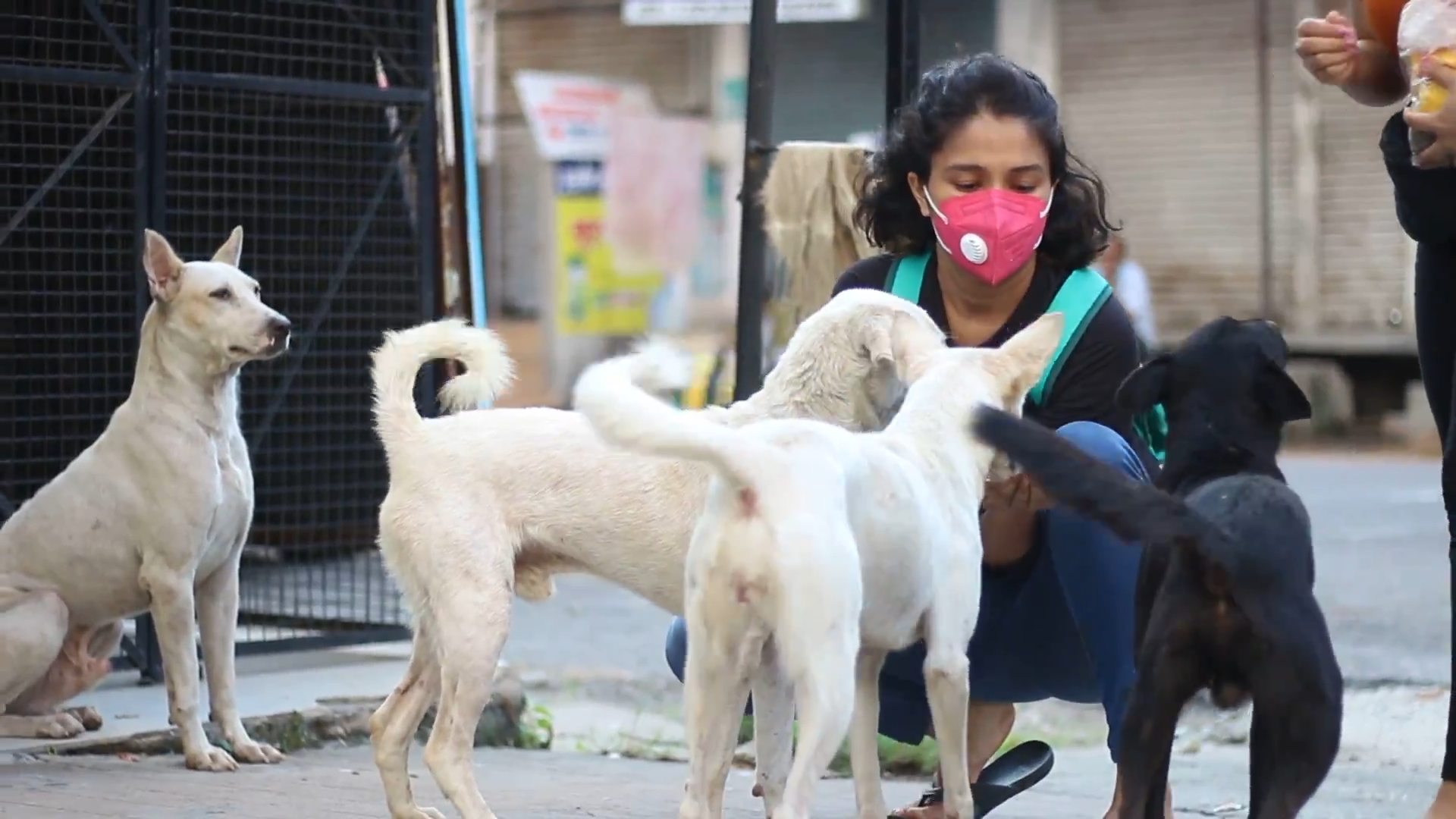
Determined to make a bigger, more sustainable impact, Mouli decided to scale her efforts by turning this passion into an organisation. “Every animal deserves to be treated with love. That’s all they want, really. But since dogs are our closest animal companions, we focus on them,” she explains.
In her journey to formalise her work, Mouli sought help from people around her, even when she wasn’t sure how to go about registering an organisation. “When I went to get this registered, they were asking me whether I wanted this listed as a society, trust, or Section 8, and I didn’t really understand. So, I learnt everything on the go,” she admits.
Her dedication to animal welfare deepened when she pursued a master’s in Animal Protection Law from NALSAR University. The training she received gave her invaluable insights into the practical realities of animal welfare movements both in India and globally. “It gave me a lot of depth into the subject. It made me perceptive enough that even if I’m sitting with someone with completely different takes on these matters, I can still have an informed and well-intended conversation with them instead of making it a fight,” Mouli says. “It is important to make the movement about the larger picture, not just for yourself.”
Onboarding like-minded people
Mouli’s commitment to the cause resonated with many others, including Aman Vishera, a filmmaker from Mumbai, who met her during a shoot in Lucknow. “I had always wanted to be involved in some type of NGO and work for welfare. Since we’re both artists, we agreed on the fact that art can truly help us teach kids about other living beings and animals, and how they also feel emotions and pain just like us,” Aman explains. They now work together to create curricula, study materials, and stories that they share with children to teach them about animal welfare.
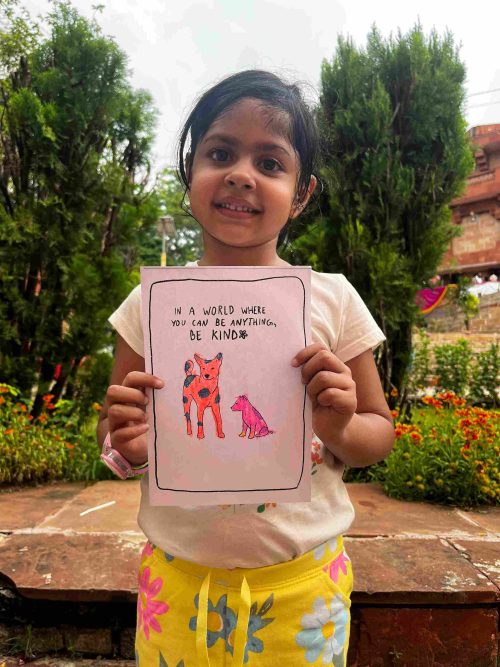
Meghna, another member of the team, shares her own motivation for joining. “Someone dumped a puppy outside my house, and in trying to figure out what to do, I found Mouli,” she shares. Meghna is particularly drawn to the sustainable, long-term vision of the organisation. “What’s different about the work here is that it focuses on education and awareness. The impact might be slow, but it’s more sustainable. You can’t go out with a stick and yell at people to make them love animals,” she adds.
From walls to minds
The Kind Hour Foundation has found a unique way to incorporate art into their activism. Street art, as Mouli notes, is a powerful form of expression that can reach people where they live. “Why are they painting a dog?” somebody would ask. “We’d say, ‘Well, because he lives in this street.’ And just like that, it makes sense,” she explains.
Mouli’s street murals have made a significant impact around Lucknow and beyond. One of her most notable projects was painting a dog on an old abandoned government building in Lucknow, which garnered a positive response from the community. “It got a lot of people talking. People started noticing the painting. You have to come with us to meet the dogs,” she invites.
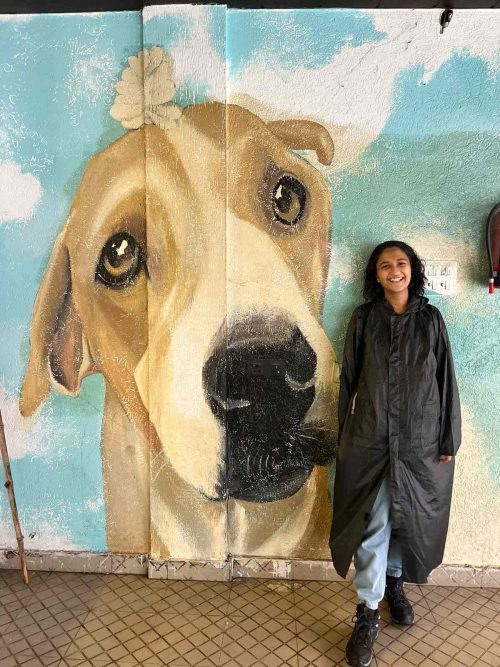
Another mural at a backpackers’ hostel in Rishikesh has been a lasting success. “It’s been four years, and people still love that painting,” Mouli beams.
In addition to murals, the foundation engages with students through workshops. “At a school, we painted a wall with the children, and they were so happy to engage in that activity. We taught them about the animals being painted and made them understand how they should be treated,” she recalls.
As artist Ernest Zacharevic aptly put it, the true power of street art is that it steps out of galleries and into people’s everyday lives, where it can be seen and experienced by everyone, not just those who attend exhibitions.
Partnering with locals
The Kind Hour Foundation is focused not just on rescuing and caring for animals, but also on creating sustainable solutions that do not rely on shelters. “If one person takes care of one stray, we can eliminate the need for shelters altogether,” says Aman. “We don’t relocate dogs. We cannot overburden shelters with healthy dogs. Plus, people will become intolerant of any animal they see on the streets if we get rid of all of them,” notes Mouli.
The Foundation works with local communities to encourage shared responsibility for street animals. They provide food, rescue services, and medical care through partnerships with local vets. “We’ve had cases where animals have tumours or maggots, and they need a month to heal. After that, we try to speak to people in that particular area and see if someone is willing to take some responsibility for that animal,” says Mouli.
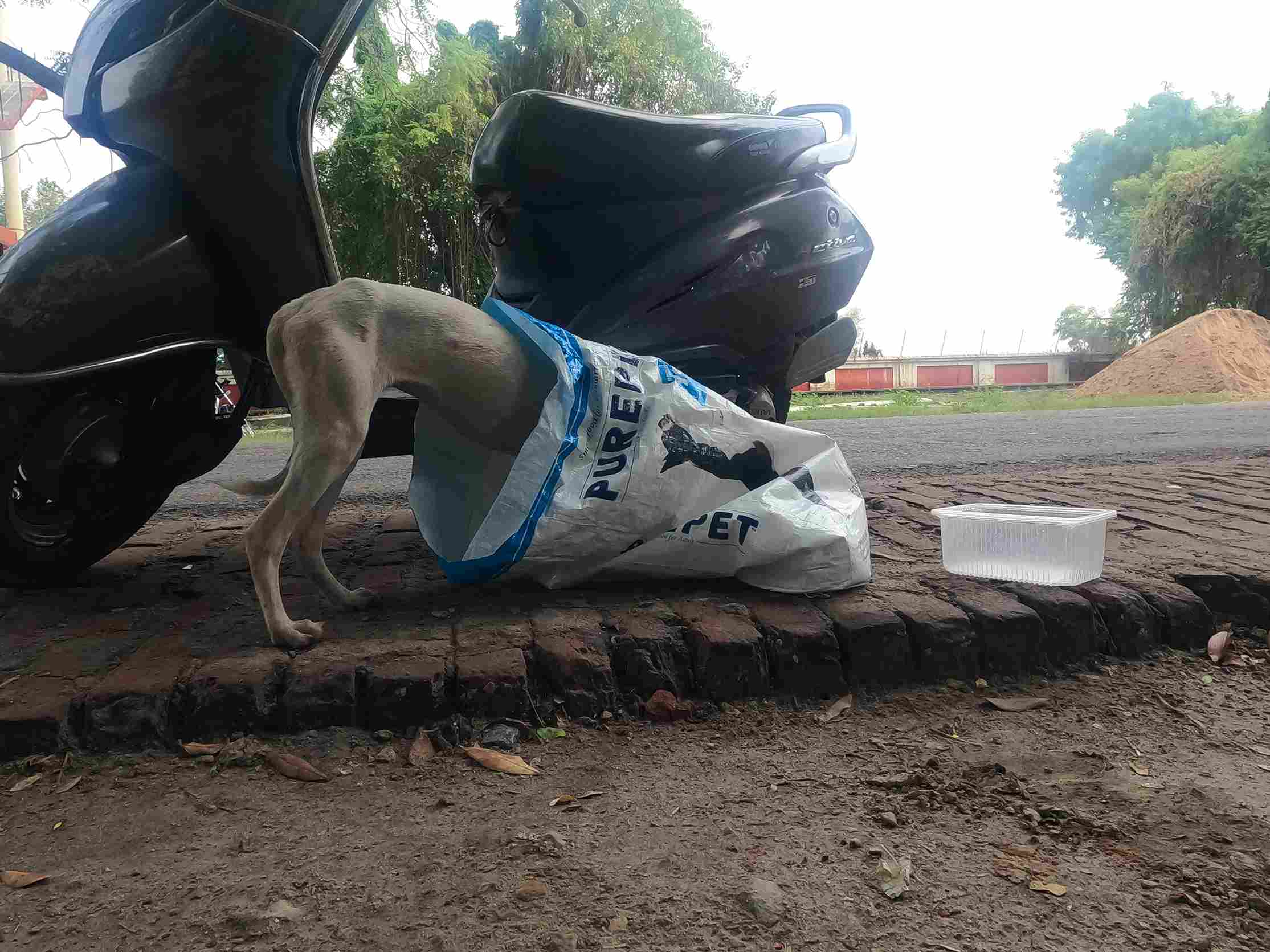
The foundation works closely with individuals like Prabha Devi, a close associate of Mouli who cares for 15-20 dogs at her home. “I have three young kids and they’ve always loved dogs. We assumed responsibility for a few of them, and then one would have babies and make the front of our house her nursing area. And this continued to the point that now we have so many just lounging around my house and the empty lot in front of it,” she says.
Prabha Devi is often affectionately referred to as “Kutte Wale Madamji” or “Fauj Wali Didi” because wherever she goes, she’s accompanied by a loyal pack of dogs. “These are good dogs raised with love, and they treat everybody with love. They’ve never bitten or caused harm to anybody. They are sweet creatures, and my house is open to all of them.”
Looking ahead: What the future holds
Mouli’s vision for the foundation is simple: “I wish organisations like ours become obsolete in the future,” she says.
Despite the challenges, particularly in terms of funding, Mouli is determined to keep moving forward. “It’s tough when it comes to donations. We don’t have a grant or any foundation that funds us. We’ve only been crowd-funded so far. Charity can sometimes feel like a one-person job, but it’s difficult. I’m thankful for the team I have. I no longer feel helpless because I’m actively working towards our goals,” she says.
The Kind Hour Foundation is directly involved in the care of over 200 dogs, providing daily meals, rescuing animals with medical emergencies, and providing seasonal necessities such as water bowls and shelter. They also conduct educational workshops with schools, municipal organisations, police officers, and resident welfare associations. Long-form, art-based classes for school children engage them with the topic of animal welfare, using educational tools such as workbooks and interactive games.
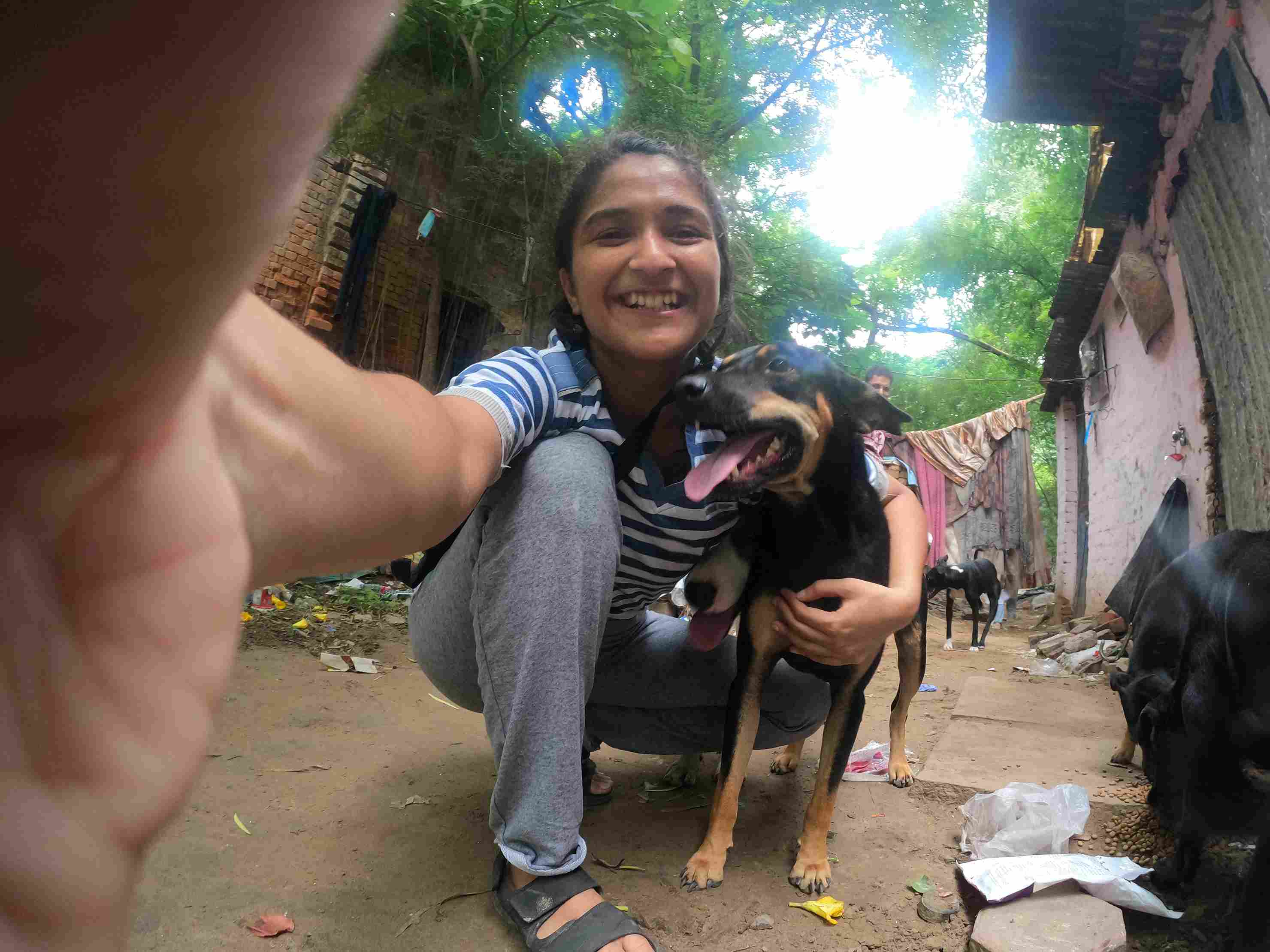
As the team works to expand their efforts, they continue to rely on the generosity of well-meaning people. This winter, the foundation aims to provide as many bed bags as possible for the animals under their care. “It’s been a struggle,” Mouli admits, “but we’re managing. Every little bit of support helps.”
Through education, art, and hands-on care, The Kind Hour Foundation is making a lasting impact on both the animals they care for and the people they reach. The slow but steady growth of this movement is proof of the power of compassion, community, art and the difference it can make in the lives of those around us.
Edited by Arunava Banerjee, All Image Courtesy The Kind Hour Foundation
No comments:
Post a Comment